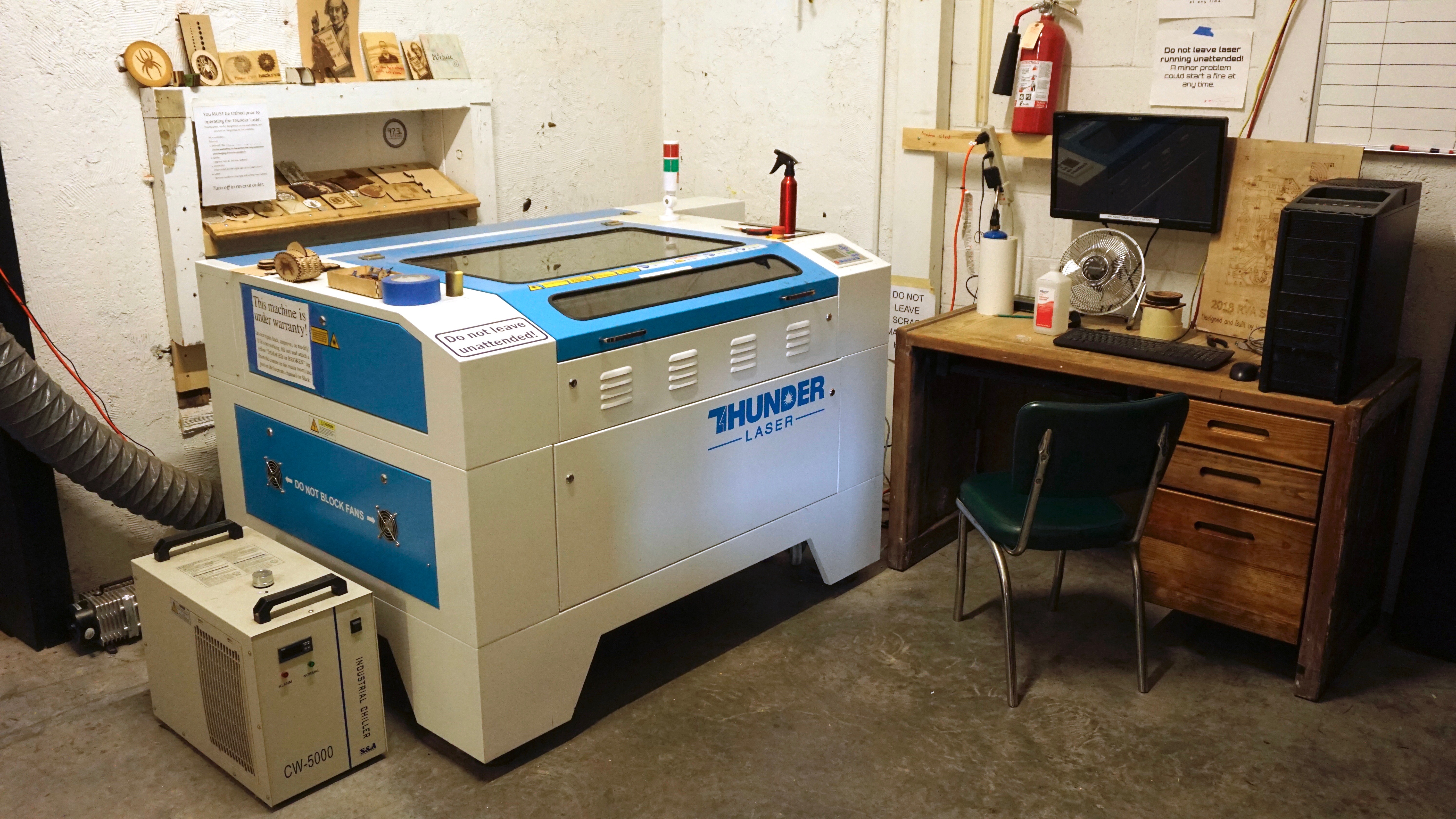Thunder Laser: Difference between revisions
Kent.durvin (talk | contribs) mNo edit summary |
Kent.durvin (talk | contribs) m (Formatted "cannot be cut" section) |
||
| Line 20: | Line 20: | ||
Materials which ''can not be cut'' include: | Materials which ''can not be cut'' include: | ||
Vinyl (including fake leather, Naugahyde, "Moleskin" notebooks, etc.) | *Vinyl (including fake leather, Naugahyde, "Moleskin" notebooks, etc.) | ||
Poly-carbonate (it cuts but then melts back together) | *Poly-carbonate (it cuts but then melts back together) | ||
Metal (It can burn off the protective paint, but the metal will not be affected.) | *Metal (It can burn off the protective paint, but the metal will not be affected.) | ||
Latex | *Latex | ||
Styrene, styrofoam, foamcore (They tend to catch fire, and they also produce lots of sooty residue) | *Styrene, styrofoam, foamcore (They tend to catch fire, and they also produce lots of sooty residue) | ||
Also, some other materials produce excessive soot, smoke, or fine threads of molten plastic that can clog the exhaust system. The fan is very hard to clean. Please be aware of what your cut is producing! | Also, some other materials produce excessive soot, smoke, or fine threads of molten plastic that can clog the exhaust system. The fan is very hard to clean. Please be aware of what your cut is producing! | ||
Revision as of 08:58, 25 August 2020
Thunder Laser
Thunder laser - Nova 35 from ThunderLaser.com
900mm x 600mm x 230mm (35.4” x 23.6”x 9.1”) 100 Watts of Power
Cuts up to 1/2 inch material Materials which can be cut include:
- Plywood
- Acrylic
- Paper, card stock, and poster board
- Vegetable tanned leather
- Craft foam
All of those can also be etched, meaning an image is burned into the surface. Other materials can be etched, like glass, ceramics, or paint.
Materials which can not be cut include:
- Vinyl (including fake leather, Naugahyde, "Moleskin" notebooks, etc.)
- Poly-carbonate (it cuts but then melts back together)
- Metal (It can burn off the protective paint, but the metal will not be affected.)
- Latex
- Styrene, styrofoam, foamcore (They tend to catch fire, and they also produce lots of sooty residue)
Also, some other materials produce excessive soot, smoke, or fine threads of molten plastic that can clog the exhaust system. The fan is very hard to clean. Please be aware of what your cut is producing!
Access and Training
Access to the Laser Cutter requires training from a qualified member.
- Read the HackRVA Laser Training.
- Watch the Training Video Playlist.
- Schedule a certification with a trainer by asking on the laserrats channel on Slack.
Helpful Links
Thunder Laser video tutorials:
http://www.thunderlaser.com/video
More Thunder Laser information:
Thunder Laser Knowledge-Base
Lightburn documentation:
https://github.com/LightBurnSoftware/Documentation/blob/master/README.md
Lightburn video tutorials:
https://lightburnsoftware.com/pages/tutorials
A 30 day trial is available at
lightburnsoftware.com
Advanced Techniques (ie comparing changing one variable, like Interval or Focus link):
www.thunderlaser.com/video/advanced-tutorial.html
Vector Graphics: en.wikipedia.org/wiki/Vector_graphics
Image Formats: en.wikipedia.org/wiki/Image_file_formats
Boxes - folding paper or cardboard: www.templatemaker.nl/
Gears: www.woodgears.ca
www.gearotic.com
Box finger joints: www.MakerCase.com
Boxes.py - wonderful box designs and more. Website and plugin www.festi.info/boxes.py
www.SVGNest.com - nests shapes for efficient cutting
Epiloglaser.com “Sample Club”. Lots of practice projects.
www.epiloglaser.com/resources/sample-club.htm
